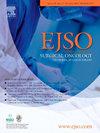Muscle-specific strength predicts postoperative complications and survival in patients undergoing curative colectomy for colorectal cancer
IF 3.5
2区 医学
Q2 ONCOLOGY
引用次数: 0
Abstract
Background & aims
Muscle-specific strength was recently proposed as a component for the definition of sarcopenia. However, no previous study has investigated the association between muscle-specific strength and postoperative outcomes. The present study aims to explore the association between muscle-specific strength and postoperative outcomes in patients undergoing colectomy for colorectal cancer. We also aimed to investigate whether addition of muscle-specific strength to the definition of sarcopenia could lead to an increased prognostic value for postoperative outcomes.
Methods
Clinical data of 1252 patients who underwent curative colectomy for colorectal cancer were prospectively collected and retrospectively analyzed. Muscle mass was measured by skeletal muscle index (SMI) determined by the preoperative computed tomography (CT) images at the third vertebra level. Grip strength and 6-m usual gait speed were measured before surgery. Muscle-specific strength was determined by the ratio of grip strength to SMI.
Results
Low muscle-specific strength was associated with a higher incidence of postoperative complications, longer postoperative hospital stays, and more costs. Low muscle-specific strength was an independent predictor for postoperative complications, overall survival (OS) and disease-free survival (DFS). Addition of low muscle-specific strength to low muscle mass and strength led to significant predictive value for postoperative complications, and a higher hazard ratio in predicting OS and DFS.
Conclusion
Low muscle-specific strength could predict adverse postoperative outcomes in patients undergoing curative colectomy for colorectal cancer. Muscle-specific strength added prognostic value to sarcopenia for the prediction of postoperative outcomes, which should be incorporated into the diagnostic criteria of sarcopenia.
求助全文
约1分钟内获得全文
求助全文
来源期刊

Ejso
医学-外科
CiteScore
6.40
自引率
2.60%
发文量
1148
审稿时长
41 days
期刊介绍:
JSO - European Journal of Surgical Oncology ("the Journal of Cancer Surgery") is the Official Journal of the European Society of Surgical Oncology and BASO ~ the Association for Cancer Surgery.
The EJSO aims to advance surgical oncology research and practice through the publication of original research articles, review articles, editorials, debates and correspondence.
 求助内容:
求助内容: 应助结果提醒方式:
应助结果提醒方式:


